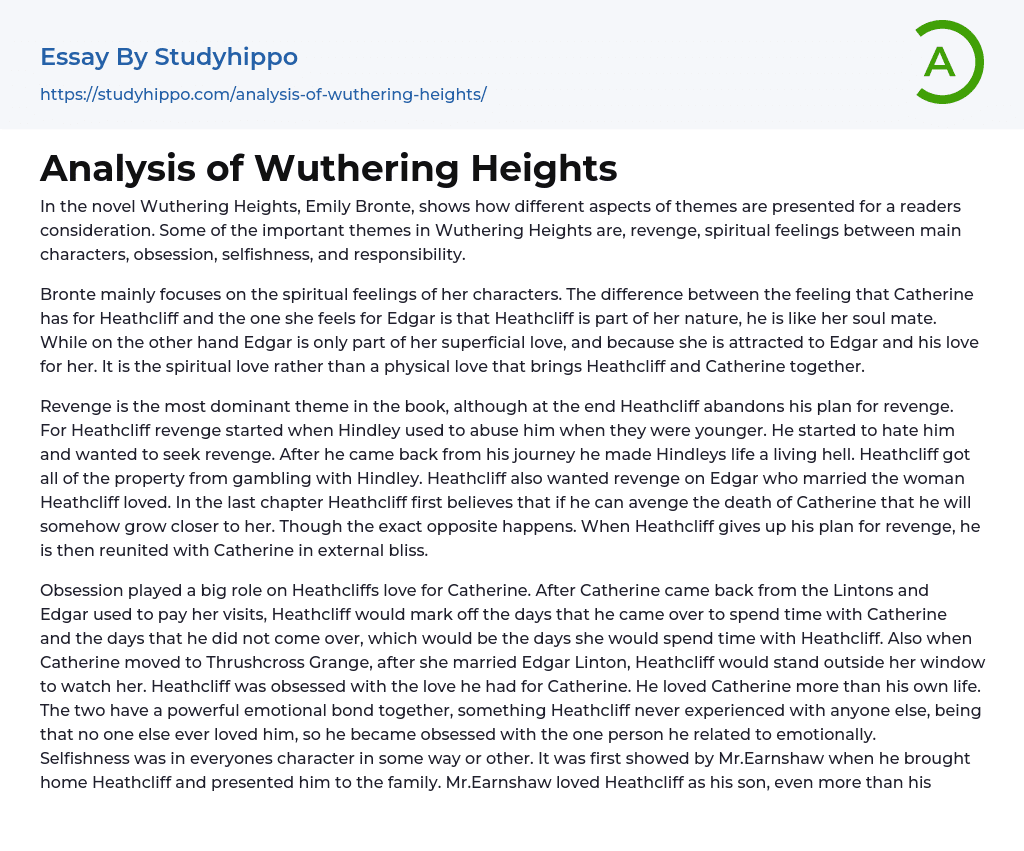In the novel "Wuthering Heights" by Emily Bronte, various themes are explored for readers to ponder. These themes include revenge, spiritual connections between main characters, obsession, selfishness, and responsibility.
Bronte's primary emphasis lies on the spiritual emotions experienced by her characters. While Catherine's love for Heathcliff is deeply rooted in their shared essence, as if he were her soulmate, her affection for Edgar is superficial in comparison. Catherine is drawn to Edgar and his devotion to her, but it is the spiritual connection, rather than physical attraction, that unites Heathcliff and Catherine.
The book primarily revolves around the theme of revenge, yet at the end, Heathcliff abandons his vengeful scheme. Heathcliff's desire for revenge initially sparked when Hindley used to mistreat him in their younger years, cultivating his hatred and longing for retaliation. Upon his return from a
...journey, Heathcliff made Hindley's life unbearable, obtaining all of his property through gambling. Additionally, Heathcliff sought revenge against Edgar, who married the woman Heathcliff deeply loved. In the final chapter, Heathcliff initially believes that avenging Catherine's death would bring them closer together. However, the complete opposite occurs. Subsequently renouncing his vengeful plans, Heathcliff is ultimately reunited with Catherine in a state of eternal bliss.
Heathcliff's love for Catherine was greatly influenced by his obsession. He would keep track of the days that Catherine spent with him and the days she spent with Edgar Linton after her return from the Lintons. Even after Catherine married Edgar and moved to Thrushcross Grange, Heathcliff would stand outside her window, unable to let go of his feelings for her. His obsession with Catherine surpassed everything else in his life; their emotional bond was stronger
than any he had experienced before, as no one else had ever loved him. This obsession stemmed from his deep longing for someone who understood him emotionally.
Selfish behavior was present in various characters throughout the story. Mr. Earnshaw, for instance, demonstrated it when he brought Heathcliff home and treated him like a son, even favoring him over his own child. This led others in the family to view Heathcliff as an outsider rather than a member of their family. Consequently, they treated him as such for many years to come. The consequences of Mr. Earnshaw's admiration for Heathcliff affected future generations. Heathcliff himself displayed extreme selfishness and ultimately caused ruin in Catherine's life when he disappeared for three years.Heathcliff's selfishness is evident in his actions throughout the novel. Not only did he ruin Isabella's life by marrying her solely for revenge, but he also forced Cathy to marry Linton and neglected to provide him with proper medical care, ultimately leading to his death. Catherine, on the other hand, displayed her selfishness by desiring both Edgar and Heathcliff simultaneously. She wanted Edgar for his social status and Heathcliff for his soul, refusing to choose between the two. This caused pain for both Heathcliff and Edgar. Nelly, as the main servant in the household, assumed most of the responsibility after Mr. Earnshaw's death. She raised Catherine and Heathcliff and later cared for Hindley's son for five years. However, once Nelly left Wuthering Heights, she could no longer be responsible for Hareton, who grew up without education and acquired bad language from Joseph, the only person who had any responsibility towards him. Nelly then took on the
responsibility of caring for Cathy, Catherine's daughter, after Catherine passed away.
The novel encompassed numerous important themes that played a role in its storyline. These themes were examined from different perspectives to help readers understand the true essence of events and their importance. The underlying idea conveyed was that the narrative was not just a love story but rather a representation of real-life circumstances.
Bibliography:
Bronte, Emily ;Wuthering Heights
- Book Summary essays
- Metaphor essays
- Reader essays
- Rhyme essays
- Literary devices essays
- Villain essays
- Books essays
- Genre essays
- Literary Criticism essays
- Writer essays
- Protagonist essays
- Simile essays
- Poem essays
- Book Report essays
- Book Review essays
- Greek Mythology essays
- Plot essays
- Tragic Hero essays
- Coming of Age essays
- Play essays
- Rhetoric essays
- Rhetorical Question essays
- Translation essays
- Understanding essays
- Reason essays
- Character essays
- Letter essays
- American Literature essays
- Literature Review essays
- Utopia essays
- Poetry Analysis essays
- Dante's Inferno essays
- Between The World and Me essays
- Incidents in The Life of a Slave Girl essays
- Flowers for Algernon essays
- Myth essays
- Everyday Use essays
- Boo Radley essays
- Genesis essays
- Richard iii essays
- Alice in Wonderland essays
- On the road essays
- Ozymandias essays
- The Nightingale essays
- Holden Caulfield essays
- Animal Farm essays
- 1984 essays
- A Hanging essays
- Shooting An Elephant essays
- A Tale Of Two Cities essays




